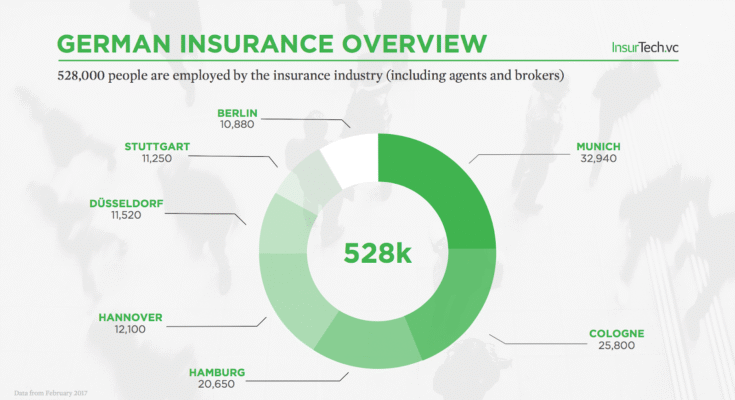Understanding Insurance in Germany: A Practical Guide
If you are living in Germany or planning to move there, understanding how insurance works is important. Germany has one of the most comprehensive insurance systems in the world. For many people, it can feel confusing at first. There are rules about what is required by law, what is optional, and what is simply wise to have.
This post will help you understand the different types of insurance in Germany, how they work, and why people have them. I will keep things as clear and straightforward as possible. Think of this as a friendly guide from someone who has spent time figuring it out and wants to share what they learned.
1. Why Insurance Is a Big Deal in Germany
Germans are known for being cautious and well-prepared. Insurance is part of everyday life here. It is common for people to have several policies, even for things you might not think to insure elsewhere.
Part of the reason is cultural. Germans value security and planning ahead. But there is also a practical reason: the German legal system can hold you personally liable for damage you cause, even if it is accidental. Insurance protects you from risks that could otherwise ruin you financially.
Some types of insurance are legally required. Others are strongly recommended. A few are truly optional, but many residents still choose to have them for peace of mind.
2. Mandatory Insurance in Germany
Let us start with the big question: what do you have to have by law?
2.1 Health Insurance (Krankenversicherung)
Health insurance is mandatory for everyone living in Germany. You cannot legally live in Germany without it.
There are two main types:
-
Public (statutory) health insurance (Gesetzliche Krankenversicherung, GKV)
-
Private health insurance (Private Krankenversicherung, PKV)
Most people in Germany are in the public system. It is not only employees who use it, but also students, pensioners, and many self-employed people. Public insurance costs are based on income, and it covers dependents (spouse, children) without extra payment.
Private insurance is usually for higher earners (above a set threshold), civil servants, and some self-employed people. Costs depend on your age, health, and the level of coverage you choose.
Health insurance in Germany is known for being very thorough. It covers doctor visits, hospital stays, medications, and preventive care.
2.2 Car Insurance (Kfz-Versicherung)
If you own a car in Germany, liability insurance is mandatory. You cannot register a car without it.
Car insurance in Germany comes in three levels:
-
Liability only (Haftpflicht): This is the minimum required. It covers damage you cause to others.
-
Partial coverage (Teilkasko): Includes theft, fire, glass damage, and some natural disasters.
-
Comprehensive coverage (Vollkasko): Covers all of the above, plus damage you cause to your own car, even in an accident where you are at fault.
Even if you have an old car, you cannot skip liability insurance. The law requires it.
3. Highly Recommended Insurance (But Not Mandatory)
After health and car insurance, there is a long list of insurance types that are technically optional but very common. In some cases, not having them is considered reckless.
3.1 Private Liability Insurance (Haftpflichtversicherung)
This is one of the most common policies in Germany. It is not legally required, but many landlords expect tenants to have it.
Private liability insurance covers you if you accidentally cause damage to someone else or their property. For example:
-
Your child breaks a neighbor’s window.
-
You bump into someone on a bicycle and they are injured.
-
You spill red wine on a friend’s expensive carpet.
In Germany, you can be held liable for the full cost of damage, even if it was purely accidental. Private liability insurance protects you from having to pay out of pocket for such claims.
Policies are usually cheap, often starting at around €50–€100 per year. Considering the potential costs you are protecting yourself against, it is often called the best “value for money” insurance in Germany.
3.2 Household Contents Insurance (Hausratversicherung)
This covers damage to your personal belongings in your home. It usually includes risks like fire, burglary, water damage (e.g., from burst pipes), vandalism, and storms.
For renters and homeowners alike, this can be reassuring. Imagine replacing all your furniture, clothes, electronics, and valuables after a fire or a major theft.
Premiums depend on the size of your home and the value of what you want to insure.
3.3 Legal Expenses Insurance (Rechtsschutzversicherung)
This insurance covers legal costs if you need to go to court or consult a lawyer. Germany is known for having a legal system that can involve high costs for even small disputes.
There are different types:
-
Private legal protection (e.g., consumer disputes)
-
Work-related legal protection (e.g., employment contract issues)
-
Traffic legal protection (e.g., accidents, fines)
-
Landlord/tenant legal protection
Many people choose a package that combines several of these.
3.4 Accident Insurance (Unfallversicherung)
Statutory accident insurance covers work-related accidents, but not those in your free time. Private accident insurance can fill this gap.
It pays if you suffer permanent injury or death from an accident in your personal life. For people with risky hobbies, it can make sense.
4. Other Common Types of Insurance
Germany has insurance products for almost everything. Not all of them are necessary for everyone, but many people choose them depending on their needs.
4.1 Disability Insurance (Berufsunfähigkeitsversicherung)
This policy pays you a monthly benefit if you become unable to work in your profession due to illness or injury.
Germany’s social insurance system provides some support if you cannot work at all, but it may be limited. Private disability insurance aims to cover the gap, especially for people who want to maintain their standard of living.
It is usually more expensive the older you are, so many people try to get it when they are young and healthy.
4.2 Life Insurance (Lebensversicherung)
Life insurance pays out to your family if you die. It is not required but is common among parents or people with mortgages.
There are two main types:
-
Term life insurance: Cheaper, pays out only if you die during the agreed period.
-
Whole life / investment-linked: Includes a savings element, tends to be more expensive.
Most financial advisors in Germany recommend term life insurance as the more cost-effective option if the goal is to protect family members.
4.3 Travel Insurance (Reiseversicherung)
Travel insurance is popular among Germans, who love to travel. It covers costs like trip cancellation, medical expenses abroad, and lost luggage.
Some credit cards include basic travel insurance, but not always with good coverage. For long trips or trips outside Europe, many people buy extra policies.
5. Insurance for Renters
If you are renting a flat in Germany, there are a few insurances you will hear about right away:
-
Private liability insurance: Some landlords insist you have it before signing a lease.
-
Household contents insurance: Highly recommended to protect your belongings.
-
Glass insurance (Glasversicherung): Covers windows and glass doors in your rental. Sometimes landlords ask tenants to take it.
Renting in Germany often means you will be asked for proof of these policies.
6. Insurance for Homeowners
If you own a home in Germany, you will likely have these:
-
Residential building insurance (Wohngebäudeversicherung): Covers the structure of the house against fire, storms, hail, and water damage from burst pipes.
-
Household contents insurance: For your belongings.
-
Liability insurance: Especially important if someone is injured on your property.
Many homeowners bundle these policies with the same provider for discounts.
7. Insurance for Pets
Pet ownership is popular in Germany. Pet insurance options include:
-
Pet liability insurance (Tierhalterhaftpflicht): Required by law in some states for dogs. Covers damage your animal causes.
-
Pet health insurance (Tierkrankenversicherung): Covers vet bills.
Dog owners, in particular, are often advised (or required) to have liability coverage.
8. Insurance for Self-Employed People
Freelancers and business owners in Germany have extra insurance concerns. For example:
-
Health insurance: Still mandatory, but you choose between public and private.
-
Professional liability insurance: Covers claims that your professional mistakes caused damage.
-
Business contents insurance: Protects office equipment, inventory.
-
Legal expenses insurance: Especially helpful for contract disputes.
Many self-employed people take extra care with insurance because they do not have the safety net of an employer.
9. How to Choose an Insurance Policy
If you are new to Germany, picking insurance can feel overwhelming. Here are a few tips:
-
Compare providers. Germany has many insurers, with big differences in price and coverage.
-
Read the fine print. Pay attention to exclusions, coverage limits, and deductible amounts.
-
Ask around. Friends, colleagues, or online forums can share their experiences.
-
Consider brokers. Some independent brokers can help you compare options without charging you directly (they earn commission from insurers).
Do not just buy the cheapest policy. Think about what you actually need and what risks you want to cover.
10. Cost of Insurance in Germany
Costs vary widely. Here are rough annual examples to give you an idea:
-
Health insurance: Around 14–15% of gross salary for public (split with employer), private depends on age and health.
-
Car liability insurance: €300–€1,000 depending on car, driver profile.
-
Private liability insurance: €50–€100.
-
Household contents insurance: €50–€150.
-
Legal expenses insurance: €150–€300.
-
Accident insurance: €50–€200.
-
Disability insurance: Often €500+ depending on benefit level and age.
-
Life insurance: Varies hugely. Term life can be cheap for young people.
-
Pet liability insurance: €30–€100.
-
Pet health insurance: €100–€400.
These are ballpark figures. Actual quotes depend on your personal situation.
11. Where to Buy Insurance in Germany
You can buy insurance:
-
Directly from insurance company websites
-
Through local offices (many have agents who can advise you)
-
Through independent brokers who compare multiple providers
-
Online comparison sites (like Check24 or Verivox)
Many Germans still like talking to a broker or agent in person. Others prefer online sign-up for convenience.
12. Canceling or Changing Insurance
German insurance contracts often run for a year at a time and automatically renew. To cancel, you usually have to give notice several weeks before the renewal date.
For some insurances (like health or car), you can change providers if your situation changes.
Always read your policy for cancellation rules. If you are stuck in a long contract, you may have to wait to switch.
13. Final Thoughts
Insurance is not the most exciting topic, but in Germany, it is something you really need to understand. The system is thorough, and there are policies for almost every imaginable risk.
The key is to know what is mandatory, what is recommended, and what suits your personal situation. By taking the time to choose carefully, you can protect yourself from nasty surprises and enjoy life in Germany with more confidence.
If you have questions about a specific type of insurance or want help choosing one, do not be shy about asking a broker or talking to your friends in Germany about what they use.
In the end, insurance is not just about ticking boxes. It is about knowing you have a safety net when you need it most.
I hope this guide helps you make sense of insurance in Germany. Feel free to share your own experiences or questions in the comments below.



